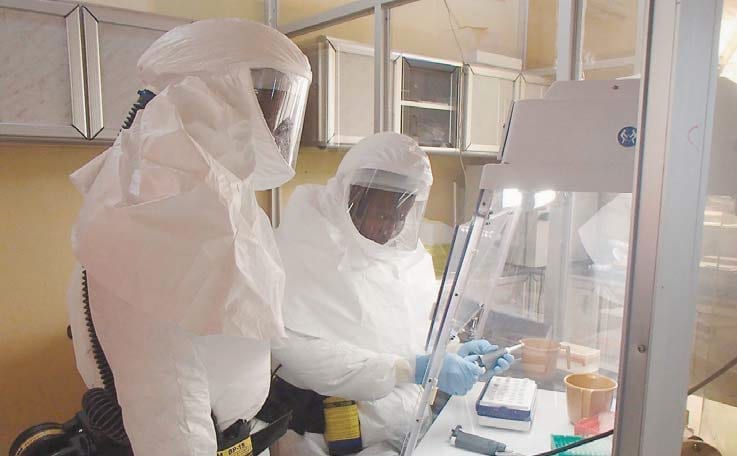Army researchers are working on developing vaccines for the deadly Ebola virus, as well as combating the spread of the virus and caring for those who are infected. The virus has recently killed more than 800 in Sierra Leone, Guinea and Liberia.
One of these researchers is Dr. Randal J. Schoepp, a diagnostics specialist and chief of the Applied Diagnostics Branch, U.S. Army Medical Research Institute of Infectious Diseases, known as USAMRIID.
Schoepp spoke by telephone from Monrovia, Liberia, with WAMU radio talk show host Kojo Nnamdi about efforts to fight the deadly Ebola outbreak in West Africa.
Colleagues at USAMRIID, along with researchers from Public Health Canada, helped develop the serum given recently to two U.S. medical workers, Dr. Kent Brantly and Nancy Writebol, who contracted the virus while working with patients infected by Ebola in West Africa, Schoepp said.
The serum is “basically a cocktail of three humanized, monoclonal antibodies produced in tobacco plants,” he said. Humanized, monoclonal antibodies are derived from animals whose protein sequences have been altered to more closely resemble those produced by humans.
Initially, the researchers looked at six antibodies. Three of the most promising were then down-selected, he said, and were tested on non-human primates at various concentrations and time periods throughout their infections. The results of the studies showed that when these antibodies were administered in the final, most advanced stages of Ebola, the primates recovered.
“That’s huge in our field,” he said. If the two Americans recover, the next step for researchers is to develop clinical trials, he said, adding that it’s way too early to make conclusions about the efficacy of the treatment.
Schoepp has been working in West Africa for a number of years on diagnostics for other viruses. In 2006, he conducted research on Lassa Fever in Sierra Leone. Like Ebola, it is a viral hemorrhagic fever, meaning that one of the symptoms is bleeding caused by damage to the vascular system.
Lassa differs from Ebola in that it predictably occurs in about the same time every year, he said, with about 500 to 700 cases. But Schoepp found that of those cases, only 30 to 40 percent were Lassa. So he began to study the 60 to 70 percent that were not and found that they were closely related to the Zaire strain of Ebola.
Since Schoepp’s diagnostics research on the Zaire strain has been carried out for a number of years, he said he’s hopeful some of that will be useful in studying the West African Ebola. Working in West Africa is particularly challenging, he explained. “We have to bring almost everything with us,” he said. “When we arrived here in Liberia, we had to set up the entire laboratory, train the staff and then supervise them as they help fight the disease in their own country.”
Diagnostics, Schoepp’s specialty, is detective-like work. The strategy involves using a molecular assay such as PCR, or Polymerase Chain Reaction, that looks for particular signatures in the genome of the virus, he explained. Another approach, he said, involves the use of immunodiagnostics to detect either the virus or detect the antibodies in an infected person. He credits USAMRIID with testing some of the early antibodies IgM, or Immunoglobulin M, and the later antibodies IgG, or Immunoglobulin G, which appear after the Ebola virus attacks.
Researchers at USAMRIID are “trying to continue to improve on those assays to make them easier and more specific and sensitive,” he added. One of the biggest hurdles to fighting the Ebola virus, he said is not medical, but rather cultural.
Most who contract Ebola get it when preparing the bodies of loved ones for burial. “In Africa and other regions of the world it’s traditional to wash the body, to caress the body, to kiss the body,” he said. In some of the more isolated societies, people even drink the blood of the dead as a way to honor them, he added.
So these practices “are leading to an increase in the number of infections we’re seeing,” he said. These cultural practices are “very delicate to deal with in West African societies. You have to tread very lightly and bring it to them in a way they’ll understand so they consider changing those practices. We haven’t made it to that point yet. That’s why we’re seeing this outbreak continue.”
Source: Article courtesy of David Vergun, ARNews
Image: A technician sets up an assay for Ebola within a containment laboratory. Samples are handled in negative-pressure biological safety cabinets to provide an additional layer of protection. Credit: U.S. Army photo by Dr. Randal J. Schoepp


